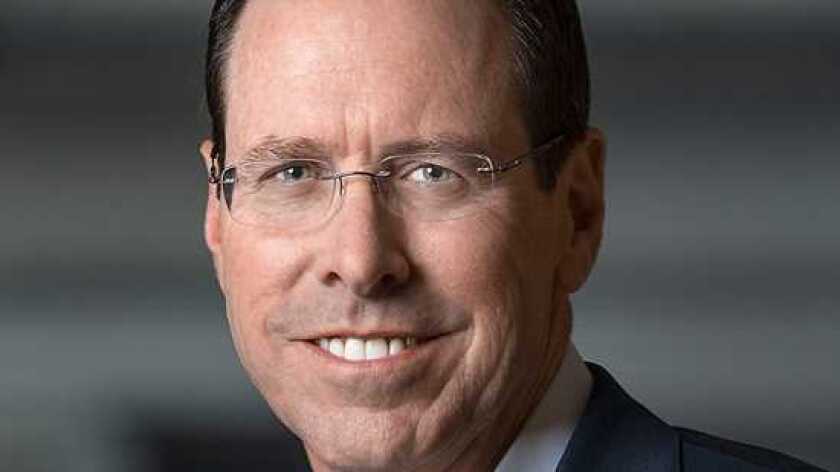The hedge-fund group, which says it owns $3.2 billion worth of AT&T stock, has written a damning letter to the board criticising its “long-term underperformance”, and the policy of CEO Randall Stephenson (pictured).
AT&T was worth $268 billion last night, implying Elliott has a 1.2% stake. However, the company has $162 billion of debts.
The letter from Elliott says: “Over the past ten years, for example, AT&T – a ‘bellwether’ in all senses of the word – has not only failed to keep pace with the broader market, but has actually underperformed by over 150 percentage points.”
The letter claims: “AT&T has been a disappointing investment for its shareholders relative to nearly any benchmark.”
AT&T responded last night with a deadpan comment, saying it “will review Elliott Management’s perspectives in the context of the company’s business strategy”, and adding: “We look forward to engaging with Elliott. Indeed, many of the actions outlined are ones we are already executing today.”
AT&T said its “strategy is driven by the unique portfolio of valuable businesses we’ve assembled across communications networks and media and entertainment, and as Elliott points out, is the foundation for significant value creation”.
But the letter from Elliott will make uncomfortable reading at AT&T’s head office in Dallas and among the company’s staff.
Though Elliott says it admires the portfolio of assets that AT&T has built up, it implies that perhaps it is too diverse. “AT&T can unlock significant value by focusing its asset portfolio, improving operational performance, instituting clear capital priorities, and enhancing leadership and oversight.”
The move comes at a critical time for AT&T. The company has made major management changes in the past few days, and has appointed a COO whom many see as an heir apparent to Stephenson. The company’s response to Elliott may well influence the strategy of the new management team as executives take office.
The letter praises Ed Whitacre, the CEO of “the smallest of the Baby Bells, Southwestern Bell (later renamed SBC)”, under whose “famed stewardship” the company acquired a series of other telcos, including the old AT&T Corporation, which gave it its current name.
“On the day Whitacre retired [in June 2007], AT&T’s stock price closed at $40.53, a level it remains below today.”
The price was $36.79 last night. Elliott says it wants a rise in the share price to more than $60 “by the end of 2021” – an increase of around 70% on today’s price.
Elliott complains about “AT&T’s recent questionable M&A”, including a failed attempt to buy T-Mobile US for $39 billion in March 2011. When the deal failed, “AT&T paid the largest break-up fee of all time and provided T-Mobile with a seven-year roaming deal and the invaluable spectrum it needed to develop from a then-struggling competitor into the thriving force it is today”, says Elliott.
The Elliott letter also criticises three successful M&A deals. The $67 billion acquisition of DirecTV in 2014 had “damaging results”. It says of the $109 billion purchase of Time Warner: “However, despite nearly 600 days passing between signing and closing (and more than a year passing since), AT&T has yet to articulate a clear strategic rationale for why AT&T needs to own Time Warner.”
Further, “the push into the Mexican wireless market, for example, has also severely underperformed expectations”.
Elliott notes ironically a comment made by Stephenson, “at his first analyst day” after being named chairman and CEO: “When there’s a temptation to want to launch off into areas that may not be closely tied to our strengths or which are going to distract us from an operational focus, that won’t happen.”
Does this presage a break-up of AT&T if Elliott’s case is heard by the board and shareholders? Though the investor has a reputation as a “vulture fund”, according to some, and for making money out of restructuring, most of its investments have not let to an orgy of asset-stripping. After a long battle with Vivendi, also a shareholder in Telecom Italia (TIM), the two are now relatively cordial.
What seems more likely to happen is that the letter will focus the minds of people such as John Stankey, the president and COO, and Jeff McElfresh, who will take over as CEO of AT&T Communications on the retirement of John Donovan.






